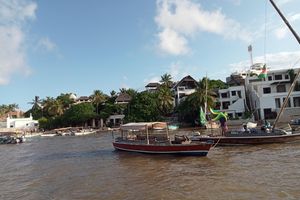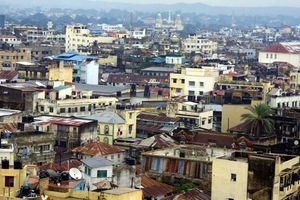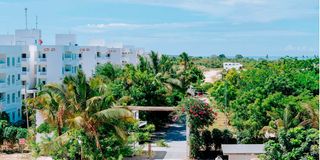
An aerial view of an ongoing development by CPS Africa in Fumba town, Zanzibar. A growing number of real estate investors are ditching Kenya's coast for Zanzibar.
About a decade ago, the Fumba Peninsula, an area overlooking Menai Bay in the Southwest region of Zanzibar Island, was covered by vegetation, with no sign of human activity on the entire seafront.
However, over the past five years, the area has transformed significantly, with real estate developers investing millions in constructing mid to high-end homes to meet the growing demand of houses from both locals and foreigners.
“Zanzibar is currently the fastest growing tourism destination in the region, with an annual tourism growth rate of 50 percent, due to its fantastic beaches and rich cultural history,” said Tobias Dietzold, a co-director of real estate developer CPS Africa, in an interview with DN2 Property.
According to Tobias, it is not just the beaches and cultural history that are attracting investors to the island. When the Covid-19 pandemic struck, while other nations imposed movement restrictions, Zanzibar, just like the mainland Tanzania, did not go into a lockdown.
As a result, many people around the world viewed it as an affordable alternative to popular holiday destinations elsewhere in East Africa.
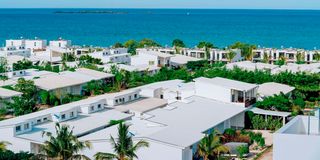
An aerial view of an ongoing development by CPS Africa in Fumba town, Zanzibar.
“The government of Zanzibar was enacting significant land and property reforms which, together with the influx of tourists, really encouraged developers to start building there,” Tobias explained.
For instance, the government offered developers tax exemptions while importing construction materials, to cushion them against from construction costs.
Through the newly established Zanzibar Investment Promotion Authority, (Zipa), investors would get everything that they needed to operate on the island legally at a one-stop shop.
“Competitors like Seychelles and Mauritius were putting out these incentives to attract investors, so the Zanzibar government also began to put out incentives that would spur investment,” said Tobias.
The government of Zanzibar also offered to provide land at a subsidised cost to developers willing to invest on the island, so that they would pass on the cost benefit to consumers.
Buyers from other nationalities were allowed to purchase property on the island, which they could access at any given time through a residency permit that however did not grant permission to work or do business in the country.
“For a long time, real estate in Tanzania has been dormant, mostly because foreigners were not allowed to buy property. In the Mainland, that is still the case. However, in Zanzibar, foreigners are now allowed to purchase property,” said Sebastian Dietzold, CEO of CPS Africa.
Before these reforms were enacted, Sebastian points out that real estate developers, who had capacity to build the number of units needed to match the high rate of urbanisation and population growth in Zanzibar, could not invest there.
And since alternative destinations had more barriers to investment, which included high cost of land and building materials, as well as bureaucratic red tape, a lot of investors preferred to take a 'wait and see' approach.
When the government of Zanzibar began implementing reforms to address the nation's emerging housing crisis, once again real estate developers began flocking to the island.

Sebastian Dietzold is the Chief Executive Officer of CPS Africa, a real estate company based in Zanzibar.
“In Fumba we are looking to build 5,000 residential units on 149 acres. Currently, we have handed over 700 units, with 600 others under construction. That is nothing compared to the actual demand here,” noted Sebastian.
The demand for housing on the island is so high that Joel Lyaruu, Head of Communications at CPS, says that a few weeks ago, within half an hour of launching 250 residential units online, the real estate firm sold 80.
While some are purchasing for investment purposes, capital appreciation and rental yield, others buy to diversify their portfolio or increase their residences to two or three.
Yet others, like the Tanzania diaspora, are drawn to the island emotionally, others go there looking for a place to retire to, whereas others from volatile parts of the world settle on the island because their home countries have become too hectic or insecure.
“Zanzibar as a destination has significantly evolved in terms of its source markets, which have increased. We are seeing a lot of Europeans, Americans, Arabs and Asians viewing the island as a secure haven to settle their families,” said Lyaruu.
Unplanned development
Since the demand for housing on the island is high but the land for construction is scarce, the developers are adopting innovative ways to meet the market demand, while factoring in the elements of affordability and quality.
“Typically, African cities grow in an unplanned manner, they spread out over a wide area. If you fly over Zanzibar, you may think that it is very densely built, but actually, from an urban planning perspective, it is very low density, because you have only one or two stories,” said Lyaruu.
This unplanned development increases the level of poverty in the neighbourhoods, because people have to commute longer to access basic services such as health and education. It also costs more to connect water, electricity, waste management and road infrastructure.
“Unplanned growth is not healthy for cities. A solution for that is creating satellite cities, which are urban centres that support existing cities. In Nairobi, we have examples such as Tatu City. Here in Zanzibar, we have Fumba Town,” noted Katrin Dietzold, COO of CPS Africa.
The concept entails building many houses on a small area to create hubs that make it more economically sensible to put up certain infrastructure or provide various services.
“Suddenly it makes more sense to open a supermarket, a hospital, a good school, because you have purchasing power gathered together, which in an unplanned setup cannot happen,” stated Katrin.

Katrin Dietzold is the Chief Operating Officer of CPS Africa, a real estate company based in Zanzibar.
Using sustainable materials such as timber, which leave a smaller carbon footprint during construction, ensures that the densification does not happen at the expense of the environment.
“With the high rate of urbanisation in Africa, if we continue building using carbon emitters, we will kill our planet. We have to change the way we build and timber is the answer. Here it is viewed as a cheap building material but in Europe it is a luxury,” said Katrin.
In addition to conserving the environment, Sebastian says that timber also offers other advantages such as good heat insulation properties that make it ideal for use in a location such as Zanzibar, which is always hot and humid.
“You need a one-metre brick wall to achieve the level of heat insulation that a 10cm thick block of timber can give. Timber is also extremely exact, does not deteriorate because of humidity and can be assembled without any water on site,” posed Sebastian.
In case of a fire, Tobias says that timber does not lose its core strength because it chars from the outside to the inside, unlike steel, which begins to bend, thus losing its structural strength.
“This means that if you throw a log of wood into the fire and cut it in half later, you will find the inside intact. Engineers can calculate exactly how many millimeters of timber can char per minute, to establish how long a building can stand before evacuating,” explained Tobias.
The only issue with using laminated timber in an area whose economy depends largely on tourism is the cost. Since the developers have to import the timber from Europe or South Africa, they incur additional shipping costs. This affects the total cost of the project.
“The only way to bring down this cost is to have a fully developed supply chain for timber, from growing forests, to doing local manufacturing of mass timber. We are working with a partner called Gatsby, to see how we can achieve that here,” said Tobias.
The cost of timber is higher in Kenya compared to Zanzibar or Mainland Tanzania, mostly due to lack of policies that support production and use of timber.
For example, in Kenya, the national building code categorises timber structures as temporary, meaning one cannot get a permit to build more than one floor of a building using timber.
“We need significant policy changes to create an environment that accommodates the use of mass timber in construction,” said Newton Omondi, an architect and green building expert.
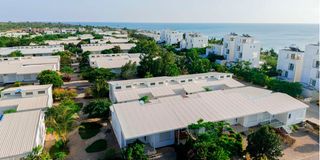
An aerial view of an ongoing development by CPS Africa in Fumba town, Zanzibar.
Newton says that buyers are now attracted to hotels or apartments that are unique in the sense that they offer a chance to become one with nature. However, many developers are unable to offer this due to the high cost of materials such as timber.
“Even as the country works on enhancing local production, reducing the duty imposed on importing laminated timber will cushion developers against high operational costs and this will boost the competitiveness of the country’s real estate sector,” stated Omondi.
Wesam Okasha, Managing Director of TUI Blue Hotels, concurs, but points out that any policy reforms aimed at spurring investment at the coast would not make sense, unless access to these properties is enhanced.
While several towns in Kenya’s coast boast beaches and cultures that are just as good as those of competitors like Zanzibar, Wesam says that these areas often grapple with infrastructural deficiencies that impact their investment potential.
“Air access to areas like Malindi remains poor despite promises that the government will extend the Malindi International Airport runway to accommodate larger planes. Guests currently have to land in Mombasa then connect from there,” noted Okasha.
In Zanzibar, the government has invested heavily in upgrading the airport to international standards so as to attract investors.
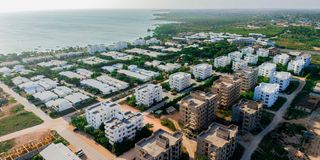
An aerial view of an ongoing development by CPS Africa in Fumba town, Zanzibar.
“Flights connecting other parts of the world to Zanzibar are getting cheaper because all the competing airlines want to be there,” noted Govind Mundra, Head of Development, Middle East and Africa at Wyndham Hotels and Resorts.
Poor road networks and intermittent power and water supply have also been dampening the attractiveness of beachfront properties and this has resulted in some of them closing shop, with those left struggling to cope.
Jugal Khushalani, Marriott International’s Senior Director for Development in East Africa, says that streamlining land acquisition and development approvals could go a long way in reducing project delays and enhancing investor confidence.
“Navigating the regulatory framework governing Kenya’s beachfront properties can be time-consuming for investors, who often encounter complex land tenure issues, zoning regulations, and environmental conservation laws,” said Khushalani.
Additionally, with several cases of fraud and insecurity being reported, investors have to invest a significant amount of time and effort conducting due diligence on properties, to avoid costly legal tussles, fines and low buyer uptake.
Despite the challenges, the hotelier says that Kenya’s hospitality real estate market segment still holds a lot of potential, and if the much-needed reforms are implemented, it could achieve remarkable growth in the years to come.



